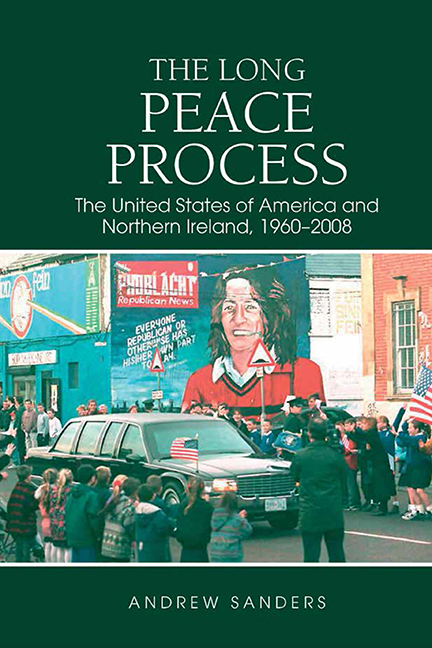Book contents
- Frontmatter
- Contents
- List of Abbreviations
- Acknowledgements
- Introduction
- 1 The USA and Ireland before 1968
- 2 The Early Years of the ‘Troubles’
- 3 Jimmy Carter and the Presidential Statement on Northern Ireland
- 4 Thatcher, Reagan, and Northern Ireland
- 5 The Bush Administration and Northern Ireland as a Local Political Issue
- 6 Bill Clinton and the Path to Good Friday
- 7 George W. Bush, Barack Obama, and Post-Conflict Northern Ireland
- Conclusion
- Select Bibliography
- Index
Conclusion
- Frontmatter
- Contents
- List of Abbreviations
- Acknowledgements
- Introduction
- 1 The USA and Ireland before 1968
- 2 The Early Years of the ‘Troubles’
- 3 Jimmy Carter and the Presidential Statement on Northern Ireland
- 4 Thatcher, Reagan, and Northern Ireland
- 5 The Bush Administration and Northern Ireland as a Local Political Issue
- 6 Bill Clinton and the Path to Good Friday
- 7 George W. Bush, Barack Obama, and Post-Conflict Northern Ireland
- Conclusion
- Select Bibliography
- Index
Summary
On 25 August 2009, Senator Ted Kennedy passed away after fighting a brain tumour for over a year. Kennedy had made his final visit to Ireland in May 2007 to mark the restoration of Stormont, the culmination of forty-five years of engagement with Irish issues. His long-standing efforts against violence in Northern Ireland were recognised by the United Kingdom in March 2009 when Kennedy was awarded an honorary knighthood for his contribution to US–UK relations, as recommended by Prime Minister Gordon Brown. Brown announced the honour during a speech to Congress, in which he stated that ‘Northern Ireland is today at peace, more Americans have health care, more children around the world are going to school, and for all those things we owe a great debt to the life and courage of Senator Edward Kennedy’.
For many who served in the British government during the late twentieth century, Edward Kennedy personified what they perceived to be the unhelpful role of US figures in the Northern Ireland conflict. The United States, under President Nixon, had defined the conflict as a matter internal to the United Kingdom, a decision that would undoubtedly have been welcomed by those in London but one that met with resistance from figures in Congress. Kennedy was one of the earliest and most prominent figures to speak out against Britain's Northern Irish policies. Despite the considerable work he did later in his career to undermine American support networks for Irish republicans, work that most would consider to have been beneficial to British interests in Northern Ireland, he was unable to change the minds of many British politicians. Lord Tebbit, former Chairman of the Conservative Party, was highly critical of the decision to award Kennedy an honorary knighthood:
Edward Kennedy may never have said outwardly he supported the IRA, but he certainly leaned towards extreme republicanism. He was certainly no friend of the UK. This honour is wholly inappropriate on the basis of the sleaze attached to him after the crash at Chappaquiddick, let alone his support for nationalism in Northern Ireland. It cheapens the whole honours system.
- Type
- Chapter
- Information
- The Long Peace ProcessThe United States of America and Northern Ireland, 1960-2008, pp. 277 - 288Publisher: Liverpool University PressPrint publication year: 2019



